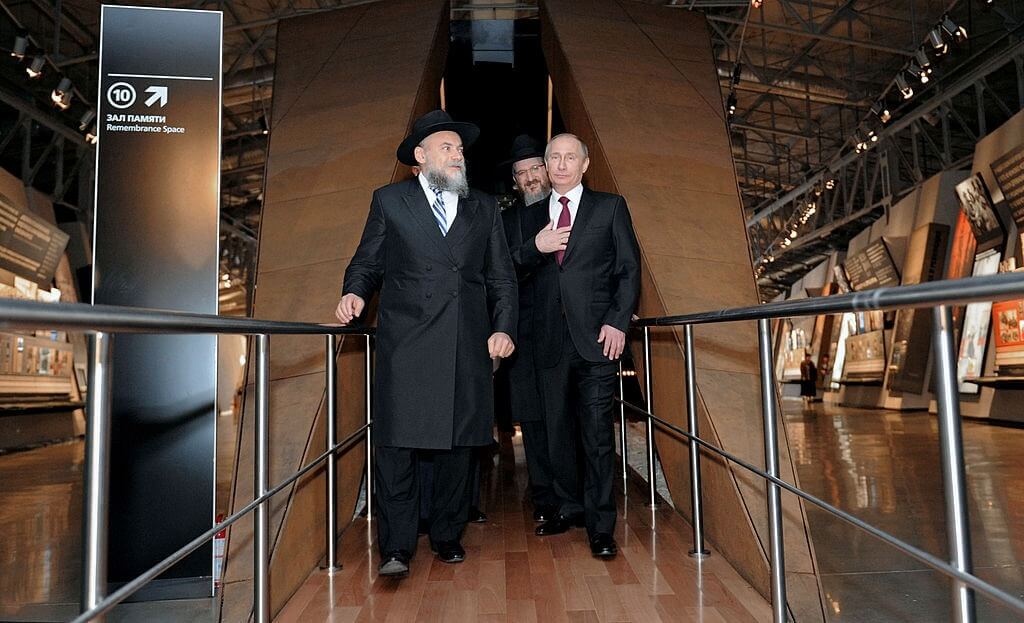In rare rebuke, Russian chief rabbi accuses senior defense official of antisemitism
Berel Lazar’s top spokesperson said he feared a remark linked to the war in Ukraine marks “a new era” for the country’s Jews

Russian President Vladimir Putin (right) with Rabbi Alexander Boroda (left) and Rabbi Berel Lazar (center) in a visit to the Jewish Museum and Tolerance Center in Moscow in 2013. Photo by Getty Images
(JTA) — In an usual move, a chief rabbi of Russia has accused a senior defense official of antisemitic hate speech in connection with the war in Ukraine, and a spokesperson for the rabbi warned of the onset of “a new era in Russia’s relations with Jews.”
Berel Lazar, one of Russia’s two chief rabbis, on Wednesday leveled the antisemitism accusation at Aleksey Pavlov, the secretary of the Security Council of Russia, a government committee of experts. In a column in the Argumenty i Fakty weekly newspaper, Pavlov spoke of the need to perform “desatanization” in Ukraine, which Pavlov claimed had hundreds of neo-pagan cults. He included “the Chabad-Lubavitch sect,” as Pavlov called it, on a list of various religious groups that he claimed prove his point.
Rabbi Boruch Gorin, the senior-most spokesperson for Lazar, on Wednesday wrote on Facebook that Pavlov’s words went farther than Stalinist propaganda in the 1930s and that he feared that the remark “will go down in history as beginning of a new era in Russia’s relations with Jews.”
Lazar’s office responded to the column with an open letter to unspecified “authorities” in Russia, calling Pavlov’s column “a piece of vulgar antisemitism.” In it, Lazar, whose group has been walking a political tightrope since Russia’s February invasion into Ukraine, said that Russian Jews “demand an immediate, unambiguous response by society and state authorities“ to Pavlov’s statements, which Lazar also termed “dangerous.”
In both Russia and Ukraine, where Chabad rabbis have established the movement as the predominant Jewish entity locally, many non-Jews use the words “Chabad” and “Hasids” interchangeably with “Jews.”
Lazar’s Federation of Jewish Communities of Russia has enjoyed good relations with the office of Russian President Vladimir Putin. Yet Lazar’s office and Gorin specifically have called out in the past what they regarded as antisemitism or discrimination of Jews by state and justice officials. Yet such protests rarely included indignant demands for action and have so far not occurred in the context of the war with Ukraine, which has prompted a crackdown in Russia on critics and perceived critics of that campaign.
“Of the rabbis active in Russia’s Jewish communities, 90% are Chabad, as am I,” Lazar wrote. Chabad is the antithesis of paganism, he added. “One might call Mr. Pavlov’s logic nonsensical, vulgar antisemitism but in fact, it is a new edition of the same old, blood-soaked libels and they are tremendously dangerous when they are said by a member of the Security Council of Russia,” Lazar wrote.
Lazar’s letter follows reports that expressions of antisemitism have increased in state-controlled media in Russia, where they had become taboo since Putin’s rise to power more than 20 years ago.
An article that appeared last month in Moskovskij Komsomolets, a highbrow Russian daily, called several well-known Jewish figures “foreign agents.” In addition, an op-ed on the site of a prestigious think tank included antisemitic language about Bernard-Henri Levy, a French-Jewish journalist who has written critically about Russia’s invasion.
Lazar and Chabad of Russia have protested vocally against several administrative moves in recent years, including the banning of a book about a Jew who kept his faith while resisting pressures to convert to Christianity and the expulsion of several foreign Chabad rabbis from Russia on various charges, including unspecified claims that they posed a danger to national security.
But the war has changed the social climate profoundly in Russia, where critical media have been shut down amid a crackdown on what remained of free speech in the country. As nationalist circles make a point of calling out so-called traitors, Lazar’s Federations of Jewish Communities has expressed its displeasure of the war, which Gorin publicly said must stop. This approach has distinguished Lazar’s group from other state-recognized Christian and Muslims groups, which have come out in favor of the war.
The departure of more than 20,000 Jews from Russia this year — a tripling of last year’s numbers and about 16% of the 2020 estimated total number of the Jewish population in Russia — has not escaped Russian media and nationalist circles. Most of it happened before the introduction last month of draft orders for 300,000 men to serve in Russia’s stalled assault on Ukraine, in which thousands of Russian troops have been killed.
Against this background, Gorin joined others warning of a return of outspoken antisemitism to public discourse in Russia, where oppression of Jews and, at times violence against them, had been policy for many decades.
This article originally appeared on JTA.org.






















